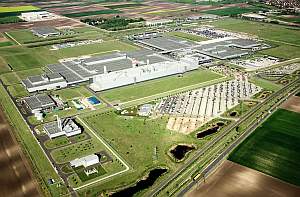MERCEDES-BENZ
Planning second assembly line in Hungary / Highly flexible production for quick response to market
 The plant in Kecskemét (Photo: Mercedes-Benz) |
German automotive manufacturer Mercedes-Benz (Stuttgart; www.mercedes-benz.com) is planning to invest around EUR 1 bn in the next few years to build a second assembly plant in Kecskemét / Hungary. Markus Schäfer, member of the divisional board Mercedes-Benz Cars, production and supply chain management, said the investment would create additional capacity and flexibility to react quickly to future market needs.
Mercedes-Benz’ current portfolio comprises 32 models which will expand to 40 models in the near future. The company said it plans to gradually electrify all passenger car model series.
Production at the new plant will be aligned with Industry 4.0 benchmark approaches. This benchmark is an assessment of digitalisation, or the connectedness and automation of the production process. The plant will have networked production systems, a fully digital process chain, and make intelligent use of production data.
Preparatory work will start this year on the facilities, which will comprise a body shop, a paint shop, a final assembly and a supplier park. Production is planned to start by 2020. Around 2,500 new jobs will be created at the site as well as additional posts at suppliers in the region and in German plants.
Mercedes-Benz noted, however, that a final decision is still dependent on various conditions.
The Kecskemét plant has been making compact front-wheel drive vehicles since 2012, producing more than 180,000 cars last year. The carmaker announced in April 2016 that it would invest around EUR 580m in a capacity expansion and technological upgrade of the plant.
Mercedes-Benz’ current portfolio comprises 32 models which will expand to 40 models in the near future. The company said it plans to gradually electrify all passenger car model series.
Production at the new plant will be aligned with Industry 4.0 benchmark approaches. This benchmark is an assessment of digitalisation, or the connectedness and automation of the production process. The plant will have networked production systems, a fully digital process chain, and make intelligent use of production data.
Preparatory work will start this year on the facilities, which will comprise a body shop, a paint shop, a final assembly and a supplier park. Production is planned to start by 2020. Around 2,500 new jobs will be created at the site as well as additional posts at suppliers in the region and in German plants.
Mercedes-Benz noted, however, that a final decision is still dependent on various conditions.
The Kecskemét plant has been making compact front-wheel drive vehicles since 2012, producing more than 180,000 cars last year. The carmaker announced in April 2016 that it would invest around EUR 580m in a capacity expansion and technological upgrade of the plant.
04.08.2016 Plasteurope.com [234687-0]
Published on 04.08.2016

 German version of this article...
German version of this article...